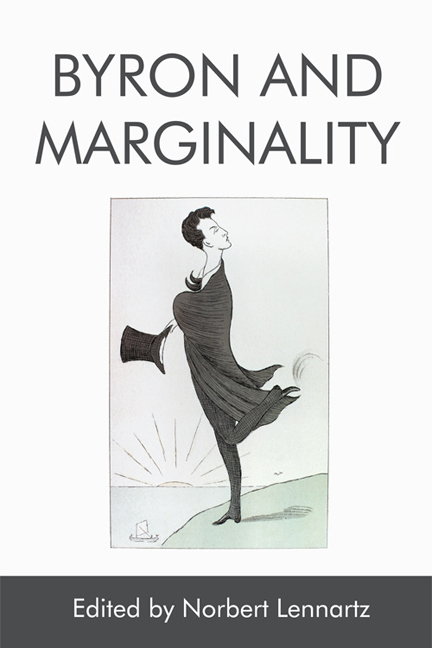Book contents
- Frontmatter
- Contents
- Foreword
- Acknowledgements
- Editions and Abbreviations
- 1 Lord Byron, Wandering and Wavering between the Centres and Margins of Romanticism: An Attempt at an Introduction
- I Byron’s Marginalisation in Romantic World Literature
- II Byron’s Marginal Identities and Places
- III Cherishing the Marginal – Marginal Genres in Byron
- IV On the Provocative Margins of Taste
- V Marginal Affairs – Visual and Paratextual Aspects in Byron
- List of Contributors
- Index
11 - ‘Stand not on that brink!’: Byron, Gender and Romantic Suicide
Published online by Cambridge University Press: 06 May 2021
- Frontmatter
- Contents
- Foreword
- Acknowledgements
- Editions and Abbreviations
- 1 Lord Byron, Wandering and Wavering between the Centres and Margins of Romanticism: An Attempt at an Introduction
- I Byron’s Marginalisation in Romantic World Literature
- II Byron’s Marginal Identities and Places
- III Cherishing the Marginal – Marginal Genres in Byron
- IV On the Provocative Margins of Taste
- V Marginal Affairs – Visual and Paratextual Aspects in Byron
- List of Contributors
- Index
Summary
whatsoe’er thine ill,
It must be borne.
(Manfred II, i, 40–1)No; not despair precisely. When we know
All that can come, and how to meet it, our
Resolves, if firm, may merit a more noble
Word than this is to give it utterance.
(Sardanapalus V, i, 223–6)It is surprising that Byron's obsession with suicide in his poetry does not seem to have been the subject of sustained critical attention. Caricatured by Peacock as Mr Cypress in Nightmare Abbey (1818), Byron's melancholy was notorious.
Count o’er the joys thine hours have seen,
Count o’er thy days from anguish free,
And know, whatever thou hast been,
’Tis something better not to be.
These are lines 33–6 of Byron's lyric ‘Euthanasia’ – not Cypress's parody. In the 1844 second edition and second volume of The World as Will and Representation (1818), Schopenhauer quoted the poem with approval, for it encapsulated his own view that life should be seen from the perspective of one's mortality as a meaningless temporary reprieve, overshadowed from the beginning by death, towards which all are irresistibly impelled. In many of his works, Byron gave serious consideration to suicide as an act of free will, which at least offered the individual control over the time, place and manner of death.
Suicide has been proved to be socially contagious and, in Persuasion (1817), Jane Austen accused Byron's early poetry of spreading the contamination of suicidal thoughts to impressionable young men. As Byron turned to comedy in Don Juan the same year, some critics have assumed his Weltschmerz was a youthful phase. He habitually used black humour to mock his own suicidal thoughts, especially after the failure of his marriage and his separation from his daughter and beloved half-sister: ‘I should many a good day have blown my brains out, but for the recollection that it would have given pleasure to my mother-in-law’ (BLJ, vol. 3, p. 165). To Lady Blessington: ‘I should possibly have destroyed myself but I guessed that ----- [Thomas Moore?] or ----- [John Cam Hobhouse?] would write my life and with this fear before my eyes I have lived on.’
- Type
- Chapter
- Information
- Byron and Marginality , pp. 207 - 232Publisher: Edinburgh University PressPrint publication year: 2018



